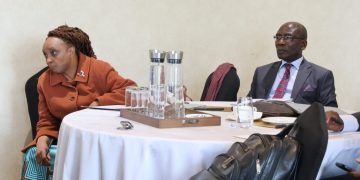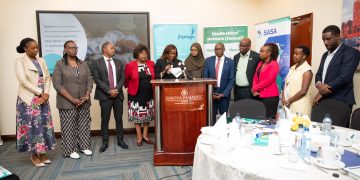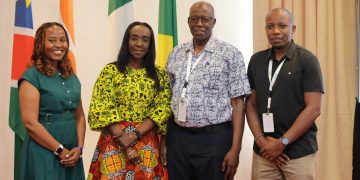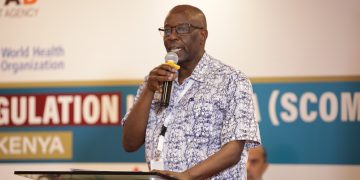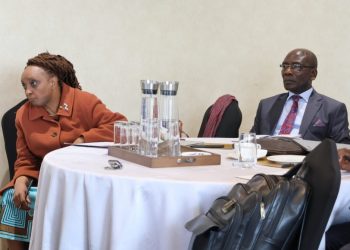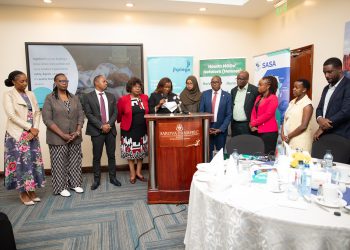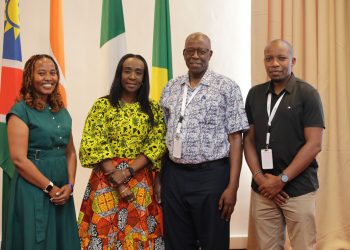By Joseph Kabia
A leading Ear, Nose and Throat (ENT) specialist, Prof. Muthure Macharia has called on the government of Kenya to take action on ear and hearing to make the voice of the voiceless to be heard.
Prof. Macharia was speaking in Nairobi during the launch of Cochlear CP802 Nucleus Sound Processor, an innovative hearing technology by an Australian company and at the sidelines of the World Hearing Day, with the theme, “Hear the future and take action now”.
He called on the government to waive the import duty on hearing devices and invest in training clinicians, nurses and community health workers on prevention, diagnosis and treatment of hearing loss.
“There is no way the world can be changed unless we hear each other. This is our moment to act,” he said at the launch, which was graced by the Australian High Commissioner to Kenya, Ms. Alison Charters and Dr. Swarup Mishra, MP, Vice Chair Parliamentary Committee on Health.
He said that since the WHO resolution on prevention of deafness and hearing loss in 1975, the agenda has been lagging at the bottom of the ladder in most of the member countries in the world. In an exclusive interview with Health Business Magazine, Prof. Macharia, who sits on the WHO technical committee in policy formulation and development of tools, confided that in 2016, less than 40 countries had laid out strategies in the prevention of deafness and hearing loss in the world.
“In Kenya, the greatest hurdle lies in devolving the strategic plan. We are limited in capacity development. There are only 80 surgeons and two audiologists in the public sector,” he said.
Prof. Macharia revealed that the University of Nairobi has instituted a diploma course in audiology that is supporting East and Central Africa region students. “We are also offering an in-service training, targeting clinical officers because they are mostly situated at the County level.
We would like to devolve the knowledge to the dispensary level so that the nurse can perform basic tests and examine the child’s ear and then escalate to the next level. More than 50 per cent of hearing loss is preventable in Kenya,” he said.
The WHO estimates that there are about 360 million people globally with hearing loss and about 91 per cent or 328 million are adults. “The recreation noise induced deafness is estimated to affect more than one billion young people in the world that constantly get out in concerts.
There is also the occupational noise induced hearing loss like in the Gikomba Jua Kali metal shades that has dangerous noise levels above normal. Even in noisy factories, workers literally refuse to put on ear muffs because they want to converse while ignorant of the repercussions later in life,” said Prof. Macharia.
He said that premature child birth and prolonged labor are some of the factors leading to hearing loss, thus calling for early screening to “ascertain a pass or fail at six weeks to six months.
“And if a fail is recorded, the case should be referred to an audiologist to establish the type of hearing loss and take the appropriate medical intervention.” According to the 2009 census in Kenya, there are 366,811 people living with hearing loss, while 236,491 suffer from speech disability.
The number is said to have risen to 800,000 according to the Kenya National Association of the Deaf. Prof. Macharia called for a universal screening of new born hearing in Kenya, saying that advancement in technology has made some procedures cheap and cheaper, “It is two to three days of training and you are done. But the government must also establish a service for intervention like surgery.
We don’t need a lot of investment, its only training. ” However, he said that the government must intensify immunization against measles in children to reduce ear infections.
“Aging in Kenya is another area of great concern. As the population ages, planning strategies must be put in place. The majority of aged people lose their hearing capacity. This should go in line with the fight against meningitis disease that contributes to loss of hearing as well as malaria, TB and chicken pox,” he said. He confided that imported devices to restore hearing loss are being highly taxed saying that there have been “major complaints lodged, to make them zero rated.”
“A single implant costs about Sh1.6million to Sh2.7million when taxed. It would cost Sh1.3 million to Sh2.1 million without tax. On top of it, the insurance companies are not paying for the implant procedures. It is only the NHIF that is paying Sh500, 000. This is fleecing the patient,” he said.
While commenting on the universal health care, Prof. Macharia said that “universal health care is feasible in Kenya if promotional efforts towards good lifestyles are heightened in line with preventive medicine, and curative measures are put in the forefront. We need to plan it properly and put adequate controls.” Operation Ear Drop (OED), a Kenyan based NGO in cooperation with charitable organizations like the Safaricom Foundation among others are in the forefront in support to Kenyans suffering from hearing loss.
A group of Kenyans have formed Cochlear Implant Group (CIGOK) that comprises of surgeons, audiologists, speech therapist and support staff, offering voluntary service in various hospitals that are well equipped in the country due to the specialty of the operation.
“We are currently seeking for resources to support an initiative for a national survey for hearing loss that has now started as a pilot project in one county in Kenya,” he said.


